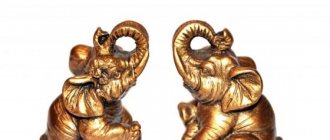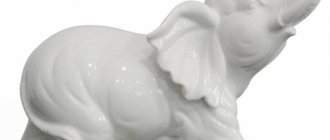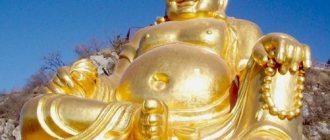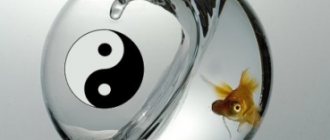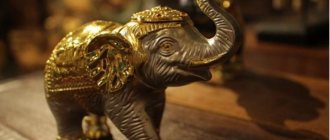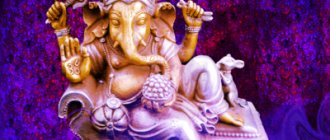In Taoist teaching, the symbol of the elephant occupies one of the leading places. In many Asian countries, it is not only considered a hardworking animal, but also symbolizes wisdom. In Buddhism it is considered sacred. A figurine of this animal, being on its owner’s desk or standing on a shelf in his house, will help improve life for the better and prevent unwanted consequences. If you are looking for an answer to the question of what the elephant is a symbol of, then we will tell you about it in this article.
Experts are confident that an elephant’s trunk can attract prosperity and success in the home. You need to install the figure near the window so that the trunk is turned towards the street, it is in this position that it will attract good luck into your home
Feng Shui elephant - meaning of the symbol
Even in Ancient India, the elephant was revered as a symbol of wisdom, prudence and invincible strength; to Buddhists it carried spiritual knowledge, stability, stability; the Chinese revered it for its longevity, prudence, and insight. The Greeks and Romans considered this animal religious, and later Christians made it a victorious symbol of Christ over universal evil and death. Residents of medieval European countries treated the elephant, like the unicorn, as mythical animals that appear only on the pages of children's fairy tales. Let's figure out what an elephant is according to Feng Shui, the meaning and power of this talisman, who needs it, and where it is best to place it.
Elephant according to Feng Shui - meaning and where to place figurines
According to the ancient Chinese teaching about the harmonious movement of energy flows, this animal symbolizes only the best and most positive, despite the deceptive slow, heavy appearance:
- Family hearth;
- Stability;
- Wellbeing;
- Endurance;
- Generosity;
- Luck;
- Confidence in the future;
- Longevity.
In addition, according to Feng Shui, an elephant figurine is considered a kind of magnet that has the power of attraction to your home of financial wealth, and also protects you from unnecessary material expenses. The figurine can be replaced with a variety of paintings, photographs, canvases and talismans.
Which Feng Shui figurines and paintings with elephants should you choose?
Despite the variety of images, one of the main roles in them is played by the position of the trunk. For example, an elephant according to Feng Shui, the meaning “trunk up” carries financial connotations. Such a talisman will help you choose the right financial policy for the family. “Trunk down” symbolizes longevity, abundance, fertility.
A white elephant will help with problems in relationships between household members, and a mother elephant with a calf is suitable for a family planning to have a child soon. There are also often figures supplemented with elements of power, this could be a toad. But since Chinese teaching is considered the science of harmonious flow, it is still undesirable to overload the elephant, because it itself is a very powerful talisman.
Sometimes there is an opinion that, according to Feng Shui, an elephant with its trunk raised will bring good luck to its owner, in contrast to an animal with its trunk down, but this is far from the case. The main rule here is the correct choice of location for the figurine.
What does the figurine placed in the house symbolize?
According to Feng Shui, the elephant is one of the four animals, along with the tiger, lion and leopard, that represent power. He is also prescribed all the qualities of a good and highly moral leader:
- is a symbol of strength, patience, wisdom and kindness;
- imparts prudence, energy and sanity;
- provides reliability, stability and well-being.
The peculiarity of the elephant is that it attracts great luck associated with the fact that the head of the family gains power and occupies a high position in society , which means that a reliable foundation for life will be created for the family.
In Buddhism, the elephant is considered one of the seven treasures; its image is included in mandalas and revered during religious holidays. According to legend, Buddha was conceived by entering the side of his mother in the form of a white elephant.
In different countries, attitudes towards the elephant are different , but one thing remains unchanged - it is revered as a symbol of confidence and self-sufficiency:
- According to Indian mythology , the earth rests on the back of an elephant standing on a turtle. It is believed that he has so much power that he is able to hold the whole world in harmony on his body. And one of the most powerful gods of Hinduism, Ganesha, who fulfills any desire, has an elephant’s head.
- In China, the most common image is of an elephant with a lotus flower on its back, in which sits the Bodhisattva Samantabhadra, personifying complete compassion.
- In Thailand, the white elephant is a state symbol, as residents are convinced that this is a form of the future Buddha.
Reference. Elephant in Chinese sounds like “xiang”, which is absolutely consonant with the words “prime minister”.
According to ancient belief,
the elephant is the bearer of jewelry that helps to satisfy desires , so its symbolic presence in the house means good luck in the sense of dreams coming true.
We recommend: How to catch luck by the tail: talismans for happiness and luck in all matters. Secrets of distinguishing the original when purchasing
An ideal way to represent the energy of luck in your home is to place a couple of elephant figurines on either side of the front door. At the same time, if installed outside, they will protect the well-being of the family, and if placed inside, they will attract good luck.
The meaning of an elephant figurine with its proboscis raised up
The figurine of an elephant with a raised trunk symbolizes the movement of vital energy Qi , which is constantly changing. The second name for Qi is Dragon Breath. The presence of such a symbol of an elephant with a raised trunk in the house means that there will be:
- constant updating of luck;
- attracting more and more benefits;
- growth of position in society;
- achieving new goals.
The color of the elephant figurine has a specific meaning:
- white – attracts good luck, resists negative energy, prevents quarrels and disagreements in the family;
- golden – attracts material well-being, fulfills desires related to acquisitions and career;
- green , made from jade, affects the energy of children, their academic success, and helps create harmony between spouses;
- yellow , amber - improves health, attracts vitality, fulfills desires.
Important! An ivory figurine of an elephant has the opposite effect and brings bad luck and destruction to the house.
It is best to place an elephant with its trunk raised on the window, in the favorable direction of the head of the family:
- A figurine facing the street will attract the energy of wish fulfillment.
- The elephant looking inside the room will help keep everything in a stable state.
To improve relationships with colleagues at work and protect against troubles, you should place a figurine of a white elephant with a raised trunk on your office table, aimed at your workplace.
With omitted: what does it mean and where to put the talisman?
Huge figures of elephants with their trunks down stand along the road leading to the burial places of people belonging to famous dynasties of China. However, despite the mournful appearance of the statues, the ancient custom says that by petting this elephant, a woman will give birth to a son with a strong character, who will become a reliable support for her entire family. This is where the different interpretations of the symbol come from:
- on the one hand, according to Feng Shui, a figurine of an elephant with a lowered trunk symbolizes motherhood;
- on the other - grief, despondency and sadness.
We recommend: The best amulets for zodiac signs for 2021: how to choose a talisman and how to make it yourself?
In this case, you should act according to the main rule of Feng Shui: feel the energy of the symbol with your soul.
- If an elephant evokes positive emotions , you should buy it and place it in the corner corresponding to the direction of the woman’s Gua, remembering to stroke it every day.
- If an elephant really brings sadness , then you should refuse to purchase it. And as a symbol of motherhood, two figures of elephants with a raised trunk and one kneeling elephant should be installed in the bedroom.
Important! It should be remembered that in Feng Shui, images symbolizing people are often taken literally. Thus, the figure of an elephant with a small elephant calf can help with the birth of a child, but indicates an incomplete family.
Feng Shui elephants, where to place them in the house
Where to put elephants in the house
To achieve certain goals, first of all, it is worth determining the place where the elephant should stand. After all, a lot depends on this choice.
- To attract good luck, the elephant should be placed on the windowsill, with its trunk facing the street. With it, he will, as it were, draw positive energy from the outside. But here you should be careful, as soon as you feel a surge of well-being, the figurine must be turned to face the inside of the apartment, for its further preservation;
- By installing two elephants facing the entrance opening, you can protect your home from negative energy;
- To neutralize the negative energy “Sha” arising from a large number of sharp corners, the so-called “arrows”, figurines must be placed opposite them;
- If you place the talisman in the southeast of the apartment, your financial situation will stabilize;
- In the northwest, an elephant will help attract a strong patron, strengthen the authority of the head of the family, and in the east improve health;
- On the chest of drawers in the bedroom, 2 figures can strengthen family ties and improve relationships;
- The symbol can protect against negative energy at work in the office; for this you need to place an elephant on your desk;
- In a children's room, especially on a desk for studying, a talisman will increase perseverance and efficiency, and attract good luck;
- In a room where a lot of things along with negative energy usually accumulate, a figurine can neutralize its influence on others.
You cannot place figurines in dark corners, next to torn dirty wallpaper, broken things, otherwise their energy may affect the figurines and drown out the positive influence.
Types of figurines
Today, in any souvenir shop or specialty store you can purchase various figurines:
- White elephant. Used as an amulet to protect the family hearth. Will protect the house from dark energy and bring good luck;
- With a baby elephant. For those who dream of having children. If you already have children, then with the help of this talisman you can save them from troubles and improve relationships between generations;
- With other symbols. You should not purchase a figurine with several Feng Shui symbols. This will weaken the positive “work” of each of them;
- On gold coins. A figurine that brings wealth and prosperity. Can bring stability and financial independence.
The elephant in the East symbolizes longevity, so it should find its place in every home, and preferably in the living room
IMPORTANT: You should not purchase such an ivory figurine. It has the opposite effect. The symbol of an elephant in a house made of this material is extremely negative. The animal will "revenge" its owners for using part of the real animal.
How many elephants should there be in a house according to feng shui
We need to talk in more detail about how many elephants there should be in the house. There are many different opinions, but we will focus on the more common ones.
- “1” - strengthens the owner’s faith in himself;
- “2” - will speed up the meeting with your soulmate;
- “3” - promises the appearance of children;
- “4” - will bring wealth and stability;
- “5” - will help you open your own business;
- “6” - will attract romantic luck;
- “8” - will provide protection in the event of trouble;
- “9” - will give an additional impetus to intellectual development;
- “10” - portends positive changes in life;
- “11” - creates the prerequisites for gaining health.
Seven elephants feng shui. What does this quantity mean?
Let's take a closer look at the set of figures consisting of 7 elephants. Their magical significance is difficult to overestimate and here's why.
Elephant figurine with trunk up feng shui
The number “7” appears very often in our lives. For example:
- in the distant past there was a doctrine of seven basic metals;
- 7 wonders of the world discovered;
- famous cities of the world are built on seven hills (Paris, Moscow, Rome, London, and others);
- 7 notes in musical notation;
- 7 deadly sins of man;
- 7 days of the week;
- seven-day phase of the lunar cycle;
- 7 colors of the rainbow;
- the seven Chinese Gods of luck, as well as many other facts.
The primitive shepherds of Babylon, followed by the Sumerians, ancient Indians, Egyptians, and later the inhabitants of China and America began to consider this number special, distinguishing it from the entire digital series. Therefore, 7 Feng Shui figurines promise to achieve well-being in seven areas of life - wealth, longevity, love, luck, health, mutual understanding, universal happiness. They help to activate the right space in the home, bringing completeness and harmony.
What material to choose for an elephant according to Feng Shui
Different paintings are suitable - photographs, images on canvas, bamboo, paper, fabric and other materials.
Figurines are most often made from natural materials - wood, clay, as well as metal, glass, plastic and porcelain. The main advisor when choosing this talisman will be only your intuition, because the thing should be liked specifically by you, “to your liking.” The only immutable taboo is figurines carved from ivory. This material is very negative, and the elephants themselves are charged with deadly energy, so they cannot bring anything good. Also, you should not store or glue broken or shattered talismans. It is best to replace them with new ones. harmony, homeliness
